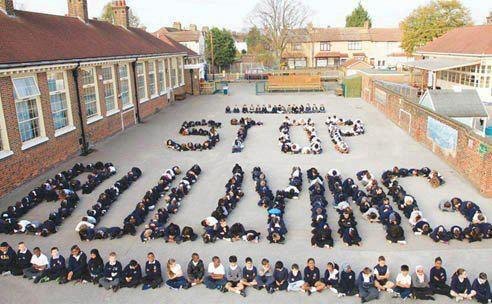According to findings from the Australian Covert Bullying Prevalence Study (ACBPS) conducted in 2013, one in four students suffer from schoolyard bullying.
However, these findings can only collate data from bullying cases that have actually been reported and taken seriously.
Indigo* is a year 11 student currently attending high school in Melbourne’s north. She says bullying at her school is constantly getting passed off as a joke.
Her experiences with harassment in school show how far there is still to go before every student is respected by their peers.
“Sexism has become the most common form of bullying that occurs in my year level, which has made it extremely difficult to maintain a positive attitude towards school,” she tells upstart.
Indigo says that the way bullying is dealt with at her school helps to play into the lack of respect.
“In my experience, the people that actually have the power to stop or punish people for their behaviour don’t seems to really care or actually want to do anything about the issue,” Indigo says. “It’s ultimately teaching young people that this kind of behaviour is acceptable which is not helping anyone.”
Hannah O’Keefe, a teacher and student leadership and welfare coordinator at Princes Hill Secondary College in North Carlton, says that one of the school’s main “pillars” is respect.

“It’s a concrete value that our school promotes, and it gives us a really strong framework,” O’Keefe tells upstart. “If we didn’t have policies on this, if it’s not written somewhere really clearly and referred to, then it would definitely leave too many grey areas.”
External programs are used by schools to help teach students what staff may have trouble teaching, such as basic respect and awareness of others.
Programs are held by external organisations to combat issues brought up in schools, from dealing with bullying, to the dangers of excessive alcohol consumption and LGBT+ issues.
O’Keefe suggests that for external programs to work in schools, the organisation implementing the program needs to have a good understanding of the school, down to the socio-economic background of the area.
“There are some awesome projects and awesome organisations, but they need to be evidence-based,” she says.
“A good program or initiative needs to first of all understand the context (of the school) in as much detail as possible, and then have that project implemented considering as many of those aspects of the school culture as possible.”
The National Association for Prevention of Child Abuse and Neglect, more commonly known as NAPCAN, has created the initiative Growing Respect.
The initiative, involving over 150 communities across Australia, uses interactive activities and workshops (referred to as Respectful Relationship programs) to help teach students what to do when experiencing or observing bullying and harassment at school.
“A key component of our work is Respectful Relationships Education which is all about teaching children and young people about the principles of healthy relationships,” Helen Fogarty, a spokesperson for NAPCAN, tells upstart.
Respectful Relationship programs focus on providing information about healthy relationships to students ranging from four to five year old preschoolers, to 16 and 17 year old highschoolers.

“We know that programs are most successful if respectful relationships education is available from an early age, with age-appropriate messages throughout their education,” says Fogarty. “The main objective of all our programs is to protect children and young people from harm.”
NAPCAN’s key messaging ‘protecting children is everyone’s business’ helps to reinforce that the whole community, not just schools, need to play a part in keeping children and families safe.
“Part of the problem has been that in the past we have assumed that young people inherently know what a respectful relationship looks like, but we now understand that that is often not the case,” tells Fogarty.
Indigo explains that her school has organised programs to come in to talk about physical bullying, but it isn’t as relevant to her age-group or peers anymore.
“We have a program in place that’s supposed to teach people about respectful relationships and anti-bullying, but the way this is taught is not effective at all,” Indigo says.
“It’s very unlikely that teenagers are going to actually take anything in, simply because we get bored and have short attention spans.”
STOP Bullying .. It’s serious problems affecting our Youths #Bullying #CyberBullying @RespectYourself #mentalhealth @911well pic.twitter.com/8geclhuWXj
— Harold Sinnott 🌐 (@HaroldSinnott) May 14, 2017
*student’s name changed for privacy reasons
 Sophie Taylor is a third year Bachelor of Media and Communications (Journalism) student. You can follow her on Twitter here: @sophieettaylor.
Sophie Taylor is a third year Bachelor of Media and Communications (Journalism) student. You can follow her on Twitter here: @sophieettaylor.







